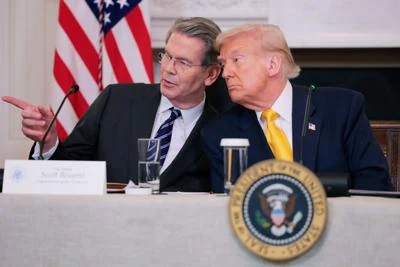The Trump administration’s latest attempt to dial back its aggressive trade stance is clashing with a sobering reality: other nations aren’t ready to negotiate.
On Wednesday, Treasury Secretary Scott Bessent doubled down on remarks he made privately to investors a day earlier, calling the ongoing tariff standoff with China “unsustainable.” However, he clarified that any easing of tensions would have to be mutual—and that the White House hadn’t yet made the first move.
In response, a spokesperson for China’s U.S. embassy accused Washington of continued mistreatment.
“Our doors are open if the U.S. wants to talk,” the spokesperson said. “But if it truly seeks a negotiated solution, it must stop threatening and blackmailing China. Dialogue must be based on equality, respect, and mutual benefit. Extreme pressure won’t work.”
Meanwhile, the EU showed no signs of compromise either. A European official told The Wall Street Journal that it wouldn’t abandon its value-added tax or agricultural subsidies. The official also posted on X that the EU was focused on strengthening ties with other nations, signaling its intention to serve as a counterbalance to U.S. instability.
Markets initially rallied on hopes of a softer U.S. tone, but gains quickly reversed as it became clear that global counterparts weren’t budging.
Some analysts suggest China and the EU sense an opportunity, as U.S. market turmoil mounts. According to a source familiar with White House discussions, some businesses have reported that tariff levels are now so high they function like de facto embargoes—prompting firms to halt imports altogether. The administration is said to be especially worried about potential shortages during the holiday season, with July Fourth and Christmas looming.
At a Washington conference, Bessent said over 100 countries have approached the U.S. about trade imbalances. Still, he echoed Trump’s longstanding grievance that past U.S. leaders enabled an unfair system that damaged American manufacturing and supply chains.
“For decades, U.S. presidents assumed our trade partners would help create a balanced global economy,” Bessent said. “Instead, we face persistent deficits caused by deliberate policy choices abroad that have hollowed out our industrial base and threatened our national security.”
Bessent’s remarks briefly lifted markets, but optimism faded after both he and White House Press Secretary Karoline Leavitt made clear there would be no unilateral tariff rollbacks on China. Stocks gave up gains and bond markets reversed course.
Trump has been known for sudden shifts in direction during his second term, and there’s little indication this latest pivot will be the last. He was expected to make more comments Wednesday evening.
“President Trump demonstrated the art of the retreat,” wrote UBS chief economist Paul Donovan in a note to clients. “But this cycle of threats and reversals is creating uncertainty, which may be affecting decisions by consumers and businesses alike.”

